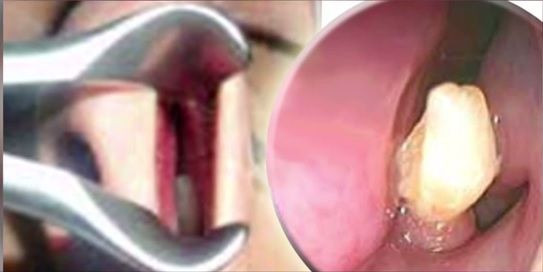Doctors Found A Tooth Growing In A Man's Nose: Have You Ever Heard Of Mesiodens?

Normally teeth grow inside your mouth, but one Saudi Arabian man had a tooth growing in a very odd place. LiveScience reports that the man experienced frequent nosebleeds occurring from once to twice a month. Concerned, he went to the doctor who discovered something very strange -- a tooth growing in his nose.
Extra teeth are actually pretty common. Studies say that between 0.15 percent and 3.9 percent of people have more teeth than usual, but the nose is not usually where they grow. "We see several cases each year,” Dr. John Hellstein, a dentist and professor of oral pathology at the University of Iowa, who was not involved in this case told LiveScience. "But for it to have erupted up and through the nasal floor — that's unusual."
The tooth that doctors discovered was a half inch long. Reports say that besides the rare inverted tooth in his nose, the man’s teeth were otherwise in good condition. The patient had something called a mesiodens, an extra tooth found in incisor teeth. "About a third of those actually develop upside down, and they can get rerouted upward, towards the nose," Hellstein said. Doctors were able to pull the tooth out using general anesthesia. The American Journal of Case report says the patient is completely healthy now and stopped having nose bleeds three months after the procedure.
The nose is not the only weird place teeth have grown, some other strange places include the brain and the eye. When a four month year olds head began to grow abnormally large, doctors scanned his brain and found a benign tumor with teeth inside of it. A 22-year-old Indian woman had a tumor growing in her eye containing two full formed teeth. These cases are rare, but historically archeologists have traced back evidence of mesiodens thousands of years ago. Mesiodens, also referred to as supernumerary teeth, was discovered 13,000 years ago among the remains of an Aborigine Australian. The US National Library of Medicine reports that archeological remains from seventh century Germany revealed an inverted mesiodens erupted into the nasal cavity.
Despite all the research, doctors still aren’t too sure why people grow extra teeth. One possible cause is cleft lip and palate, a birth defect formed when the mouth doesn't develop properly. This birth defect requires surgery that could possibly alter the way teeth develop later in life. Genetics could also play a role in the development of mesiodens. Research shows that it is more commonly found among family members. Genetic disorders such as cleidocranial dysostosis and Gardner’s syndrome have side effects that can also cause mesiodens.



























